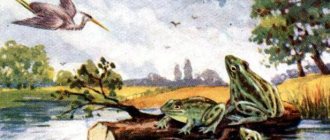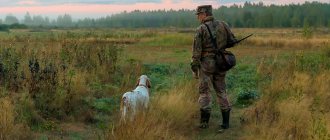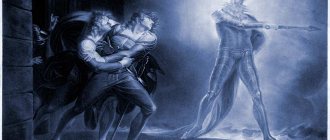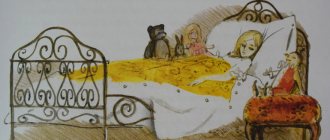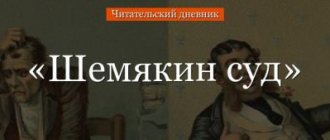Other retellings and reviews for the reader's diary
- Summary The Fault in Our Stars John Green
Sixteen-year-old Hazel Grace Lancaster has been battling thyroid cancer for several years. The girl becomes depressed and almost stops going out. - Summary of Paustovsky's Yellow Light
In Paustovsky's essay, yellow light refers to autumn leaves from which the sun's radiance emanates. The author tells with special feeling about the mystery that occurs in nature in autumn - Summary Wild Landowner Saltykov-Shchedrin
The story tells about a wealthy landowner. What saddened him most in the world were simple men. It turned out that his wish came true, and he was left alone in his estate - Summary of Chekhov's Duel
A story about the relationship between a young man Ivan Laevsky and a married lady Nadezhda Fedorovna. Some time ago, they fled to the Caucasus, leaving Nadezhda Fedorovna’s husband in St. Petersburg - Summary Zweig Letter from a Stranger
The famous writer R. sorts out the mail and finds an envelope without the sender's name. Inside is a large letter written in a woman's handwriting.
Content:
History of creation
Krylov's fable with an original plot called "Oboz" was first published in the magazine "Son of the Fatherland" in October 1812. Her appearance was not accidental. He dedicated it to one interesting episode related to the capture of Moscow by Napoleon's army. The talented commander Kutuzov was then appointed commander-in-chief, who, contrary to public opinion, did not try to drive the enemy out of the capital.
- Moral of the fable “Oboz” by Krylov, analysis, essence, meaning
No one approved of his calmness and unhurried tactics, including Emperor Alexander I. By avoiding direct military action, Kutuzov, unnoticed by everyone, weakened the enemy troops and the vigilance of the French commander.
He was sure that he would starve the French out, because he understood that they could not withstand the harsh Russian winter. And he turned out to be right:
- the plan worked;
- The Russian army won.
I.A. Krylov was initially on the side of the experienced commander. The poet knew that Kutuzov had his own cunning plan, and he would definitely carry his actions to the end. This life episode became the reason for composing the fable “Oboz”.
In short, it tells the story of several horses on carts transporting pots. The old experienced Horse goes first.
He begins to slowly walk down the mountain so as not to break the dishes. The young Horse, who follows, laughs at him, calling him a coward and incompetent. But as a result, the old horse kept all the pots, and the Horse, which quickly slid down, overturned the convoy. The fable was read in the Olenins’ house, and everyone recognized the experienced Horse as Kutuzov, and the young Horse as the Russian emperor.
Images of Krylov's fable
The analysis of Krylov’s fable “Wagon Train” in a literature lesson should begin with expressive reading of the text by role, you can also listen to audio or assign one of the children to make a presentation. Along the way, students write down characteristics of the characters in their notebooks:
- horse - kind;
- the horse is young.
The Young Horse scolds the old Horse, who was supposedly over-praised, and if it weren’t for her, he would “carry water.” The author is ironic about her words, because water must also be transported skillfully. The horse boasts: “And we won’t carry our cart, but we’ll roll it!” The result was sad: the cart fell into a ditch and the pots broke. Her curses turn out to be meaningless and useless to anyone.
If we transfer the content of the fable to people, then, when depicting the good Horse, the author means Kutuzov, an intelligent and experienced commander.
The young horse is Emperor Alexander I, who pushed the commander to take rash actions. The main idea of the work is expressed in the last lines of the fable, which says:
Everything in another seems like a mistake to us;
And you will get down to business yourself,
- Krylov's fable Oboz - history of creation
So you'll do something twice as bad.
There is a clear allusion here to the emperor's loss in the battle of Austerlitz.
Fable by I.A. Krylov "Oboz"
The fable concerns the strategy and tactics of Kutuzov in the Patriotic War of 1812. The commander was constantly subjected to constant attacks from Alexander I and military youth due to evasion from decisive battles under the walls of Moscow, and after its surrender to Napoleon. Krylov justifies the unhurried but thoughtful actions of Kutuzov, which, as the fabulist understood, should lead to the complete collapse of Napoleon, and condemned the orders of Alexander I, who rushed Kutuzov and pushed him to blunders and mistakes. No less annoying for Kutuzov were the murmurs and bitter criticism of his young associates. Probably, Krylov did not know about the words spoken by the old field marshal to the Prince of Württemberg: “Our young hot heads are indignant at the old man that I hold back their impulses. They do not pay attention to the circumstances, which do much more than our weapons could do.” All the more significant is the historical, political and military intuition of Krylov, whose fable protected Kutuzov and his plan from the attacks of inexperienced young people. Their patriotic feelings were understandable, but they did not become true.
Thus, by the image of a “good horse,” Krylov meant Kutuzov with his caution and restraint in repelling the Napoleonic invasion. Paying attention to the words: “If you get down to business yourself, you’ll do something worse” - we understand the transparent allusion to Alexander I, through whose fault the Battle of Austerlitz was lost.
Visual media
The author widely uses various artistic means.
The narrative and thoroughness of the presentation of events is given to the fable by inversions, of which there are many: “a convoy walked with pots,” “it seems to us that something else was a mistake,” and others.
There are not many epithets, since the action is described very quickly:
- “Good horse”;
- “Poor horse”;
- "Horse of praise";
- "steep mountain"
A very apt comparison is used: “it’s molded like a cancer.” Many phraseological turns give the narration and speech of the characters brightness and imagery. All the boastful emotions of the Horse are well emphasized by lexical repetitions (“left, left”), rhetorical exclamations: “brave, bold”, “What an ass!” The culmination of the fable is the Horse’s fall into the ditch and is also emphasized by the exclamations: “thump into the ditch!”, “Farewell, master’s pots!”
The fabulist actively uses the technique of allegory - allegory . The features of Alexander I are visible in the Horse, and those of Kutuzov are visible in the old Horse. In the fable, the names of animals are capitalized, hinting at people. A big role in the work is played by synonyms (“obliquely! crookedly!”, homogeneous predicates (“we’ll wave, we won’t waste a minute, we won’t take you, we’ll roll”), anaphors “I almost caught it...”, “Here’s a push...” When analyzing the fable “ Oboz" by Krylov in the 8th grade, it is worth emphasizing that with the help of these expressive means the author ridicules human stupidity, bragging, and disrespect for elders.
The moralizing meaning of the work is that smart and prudent people who act wisely will always have a good result, while arrogance and carelessness lead to loss.
In short, the moral of the fable can be expressed by the proverb “The slower you go, the further you go.”
Krylov's fables about the wolf
In these fables, one of the main characters is a wolf.
"Wolf and Crane"
The main character of the fable, a wolf, once accidentally choked on a bone during a meal. It was stuck so tightly in his throat that there was a real threat that the wild animal would die because of this nonsense. As luck would have it, a crane passed by and, seeing something was wrong, immediately rushed to the rescue. The wolf prayed for the crane to immediately pull out the bone and thereby save his life.
The crane, being kind and compassionate, put its beak almost completely into the wolf's mouth, pulled out the ill-fated bone and did not want to hear at least a word of gratitude for the work done. But what did he receive in response from the arrogant and self-confident wolf, who was dying a few minutes ago? Nothing good. The predator suggested that the bird disappear out of sight while it was still intact. This is how he thanked his savior.
The main idea of Krylov’s fable “The Wolf and the Crane” is that there are people in the world who do not value a good attitude at all. And sometimes it is better to pass by and not help in those cases when your help and your kindness will not only not be appreciated, but will also be turned against you. The most important thing when reading this fable is not to see yourself in the wolf and his unscrupulous behavior.
"The Wolf and the Lamb"
One day the little lamb was overcome with thirst. He went to the stream to drink some water. A wolf was running not far from the pond. He was very hungry. The predator noticed the lamb and decided to dine on it.
The wolf could immediately eat the prey, but that would be too easy. The beast approached the lamb and began to reproach him for polluting the water. Supposedly this is the wolf's drink, and the lamb got into it with its dirty snout. The lamb answered him that it was located downstream, so it could not pollute the reservoir with anything.
The wolf thought and thought and said that the lamb had offended him last summer. The Lamb replied that it couldn't be him, since he wasn't even born yet. The predator said that if it was not him, then it was relatives of the lamb. The lamb said that he had no relatives. The wolf began to look for different reasons why he could be angry with the lamb, for which he found excuses.
As a result, the wolf got angry and said that he was terribly hungry, and therefore the lamb would not be happy. With these words, he grabbed his victim and dragged him into the forest.
This fable reveals the full power of power and the weakness of the common people. The wolf is power, and the lamb is a simple person. No matter how hard he tried, he failed to convince the authorities. The wolf took advantage of his power and decided the matter in his favor. The same thing happens in our lives.
"Wolf in Krylov's kennel"
At night, the gray wolf decided to climb into the sheepfold. It was dark outside, and the poor fellow did not understand how he mixed up the stables. Instead of a sheepfold, the predator found himself in a kennel.
They sensed an animal in the kennel, and barking and complete confusion began. The wolf realized that he was not where he wanted to be. He felt scared, but he had to look for a way out of the situation. The dogs were ready to tear the predator apart. The gray one had a hard time, he had to be such a fool.
The wolf thought and thought and said that he had come to make peace. He is tired of always fighting with dogs, and would like to conclude a truce. Dogs and wolves, old relatives who should not fight. The wolf vowed not to touch the local herds anymore, but on the contrary, to protect them together with the dogs. The sly man called his sworn enemies friends. In general, he went out of his way to let him go.
The gray-haired Hunter did not allow the gray predator to finish. He said that wolves should never be trusted, and he unleashed a pack of hounds on him.
The fable teaches us to be more attentive to others; sometimes people lie a lot for their own benefit. You need to be careful with these. And before you know it, they will do something stupid to your detriment. There are plenty of such individuals in our world, and it is better to keep them at a distance.
Read also
The story of how one man fed two generals The Grandfather's Story (N.A. Nekrasov) The Song of the Falcon (Maxim Gorky) Poor people (F.M. Dostoevsky)
SummaryReads in about 5 minutesEssays2 essaysSummary
- How and what do Krylov’s fables teach?
One day a convoy was walking and carrying pots. We had to go down a very steep mountain. Leaving the others on the mountain, the owner began to carefully bring down the first cart. The good horse almost carried him on his rump, preventing the cart from rolling down. From those who remained on the mountain, the young horse saw the horse’s work and began to scold him for every step. Sometimes it’s not right, because he caught it on a stone, sometimes he sculpts himself like a lobster, sometimes he drives askew and crookedly, sometimes his movements seem timid to her.
It seems to a horse that riding down a mountain is very easy, not like uphill or at night. She recommends that the horse carry water if he does not know how to transport valuable cargo. And in order to completely humiliate the horse, he invites him to watch her wave and not waste a minute on such an easy task. The horse arched its spine, tensed its chest and moved off. Having rolled down the hill, the cart pressed on the horse, and the cart rolled. The horse set off on all fours over rocks, ruts and potholes. Due to the jolts and jumps, the horse and cart first went to the left, and then completely fell into the ditch. The owner's pots were broken.
People have the same problems: they criticize because the behavior of others seems wrong, and when they get down to business themselves, they do it even worse.
A very brief summary of Krylov's fables
Several condensed retellings of Krylov's famous fables.
"The Cuckoo and the Rooster"
The cuckoo admired the loud and important crowing of the rooster, and he admired its smooth and drawn-out cuckooing. They lavished mutual praise for a long time, comparing each other to a nightingale and a bird of paradise, until a Sparrow flying past laughed at their “music.”
“Why, without fear of sin, does the Cuckoo praise the Rooster? Because he praises the Cuckoo.”
"Larchik"
They brought a casket to the master, a mechanic came and tried to open it, but it didn’t work, and it just opened.
Moral: There is no need to complicate your task, since opening the casket was easy.
"Leaves and Roots"
The leaves bragged to everyone about how beautiful they were, but the voice of the roots was heard from the ground and said: “You don’t want to say thank you to anyone,” the leaves got angry, and the roots said: “If it weren’t for us, there wouldn’t be a tree and you.”
"The Donkey and the Nightingale"
The nightingale knew how to sing very well, one day the donkey listened to his singing, everyone liked the way the nightingale sang, but the donkey didn’t and he said that he should learn from the rooster.
The moral of the fable is that the judge often becomes the one who judges without knowledge of the case, and therefore such judgments cannot be taken at face value.
"Peasant and Worker"
A peasant and his farmhand walked to the village in the evening and met a bear. The bear crushed the Peasant under him and almost crushed him. The peasant prayed to the Worker for help. The worker, gathering his strength, “took half the skull to the bear with an ax and pierced its belly with an iron fork.” But the Peasant, who got up from the ground, immediately began to scold the Worker for ruining the bear’s skin with a pitchfork.
Moral of the fable: in trouble, we usually look for a deliverer with prayer, “but as soon as we get the trouble off our shoulders, then the deliverer often feels bad from us.”
Essays
Man and history in Krylov’s fable “Oboz” Fable by I.A. Krylov "Oboz"
The fable “Oboz” by Krylov was written in the fall of 1812 and first published in the same year in the magazine “Son of the Fatherland” (Part II, No. 7). This article presents materials about the morality of the fable “Oboz” by Krylov: analysis, essence, meaning of the work, etc. See: All materials on Krylov's fables
Moral of the fable “Oboz” by Krylov (analysis, essence, meaning)
The moral of the fable is that thoughtful and patient people ultimately achieve better results than those who act thoughtlessly, carelessly and arrogantly. The image of the “good horse” depicts the commander Kutuzov, who showed caution and restraint in defending against the invasion of Napoleon’s army. Krylov himself explains the moral of the fable “Oboz” in its final lines:
«Everything seems like a mistake to us:
And you will get down to business yourself,
So you’ll do something twice as bad.”
The essence of the fable “Oboz” is also reflected in the famous Russian folk proverbs:
"The quieter you go, the further you'll get."
“If you hurry, you’ll make people laugh.”
According to the poet I. I. Khemnitser, the moral of the fable is as follows:
“By the first horse we must understand a man of already known years, who has learned a lot from experience, who, therefore, conducts every business patiently, judiciously, without haste, not at random, and therefore everything works out for him, even if not quickly, but quickly. The second horse indicates a young, arrogant person who, by the very fact that he has not yet experienced any failures in life, thinks that everything is possible for him, that he is smarter than everyone else and can serve as an example for everyone. And as soon as he gets down to business, lo and behold, the matter is thrown into the ditch.
Therefore, it is not without reason that the proverb says: the quieter you go, the further you will go, that is, if you do it slowly, carefully, with reason, you won’t have to redo it, and therefore you will finish before the hasty one, and you will do it better, more accurately. This also happens in small matters: as soon as you rush, you just make people laugh.” (Khemnitser I. I., “Fables selected from Khemnitser and Krylov...”, ed. V. Zolotov, St. Petersburg, Public Benefit Company, 1878)
I. Khalturin comments on the essence and meaning of the fable as follows:
“In order to weaken and exhaust the enemy, Kutuzov retreated. Napoleon's army weakened, the Russian army grew stronger. Not everyone understood this then. Many criticized Kutuzov for his slowness. Krylov, with a brilliant instinct, understood the plan of the great commander. His fables are aimed at protecting Kutuzov. For example, the fable “Oboz”… <…> “The Good Horse” is Kutuzov. And the “young horse” are his opponents. This was clear to contemporaries." (I. Khalturin, preface to the book “Fables. I. A. Krylov”, edited by Blagoy D. D., series “School Library”, Moscow, from Detgiz, 1944)
According to teacher D.I. Tikhomirov, the moral of the fable is as follows:
“A person is inclined to consider himself better, smarter and more efficient than others and often tries to elevate himself in the opinion of others, for lack of anything better, through self-admiration. Conceit and boasting prepare their own punishment in the ridicule of others, and sometimes create their own destruction. Conceit does not allow you to see either the merits of another or your own shortcomings; conceit and self-praise blind a person, make him imprudent, careless and inevitably lead to destruction. And no one spares such people in their misfortune, just as they themselves did not spare anyone (“Oboz”, “Siskin and Dove”). Conceit is often a consequence of youth and inexperience...” (D. I. Tikhomirov, “Selected fables by I. A. Krylov for schools and people,” Moscow, type I M. G. Volchaninov, 1895)
I. V. Sergeev comments on the essence and meaning of the fable “Oboz” as follows:
“Krylov raised his sharp weapon against the enemy - a fable. He responded vividly to all the most important events of the Patriotic War. <�…>
With the fable “Oboz” he completely justified Kutuzov’s slowness. The fabulist understood that the “cooks” of Russian politics had missed a lot of precious time and had not prepared for the war, and that the arrival of Kutuzov could not create an immediate turning point in the course of military events. The general public did not understand why the commander was hesitating. Alexander I did not understand this either. The Tsar openly accused the commander-in-chief of avoiding meetings with the enemy, of withdrawing troops into the interior of the country and not accepting battle.” (I.V. Sergeev, book “I.A. Krylov”, Moscow, “Young Guard”, 1945, series “Great Russian People”)
These are the materials about the moral of the fable “Oboz” by Krylov: analysis, essence, meaning of the work, etc. See: All materials on Krylov's fables
There was a convoy with pots and it was necessary to slide down the mountain. The owner left everyone to wait on the mountain, and he himself took one cart and began to slowly descend. The horse was experienced and held back the cart pressing on him. Looking at this from the mountain, the young horse began to criticize the horse, saying that he was doing everything wrong: slowly, crookedly, jerkily. Look how she does it now - deftly and quickly! And straining his chest, the horse rushed down the mountain. But the cart began to run over the horse, it was thrown from side to side, over ruts and potholes. And in the end, the cart fell into a ditch and all the pots broke!
Popular retellings today
- Summary of the tale The Tale of the Proud Haggai by Garshin
A proud and powerful king ruled in one state. His name was Haggai. He had no friends, and all his enemies were afraid of him. The people did not rebel, everyone lived quietly, afraid of angering their ruler - Shergin
In my truly great country, they will never forget the many talented people who spared no effort and time, and contributed a piece of themselves to it, each of course their own - Gavriliada - a summary of Pushkin’s poem
The poem “Gavriliada” was written by Alexander Sergeevich Pushkin. Its summary is presented in this article. The author, Alexander Sergeevich Pushkin, makes an appeal to the most beautiful girl - Ariel - summary of Belyaev's novel
Ariel was a pupil of the Indian school Dandarat. The seventeen-year-old boy barely remembered his childhood. Teachers did everything possible so that their students would forget about their past and not ask questions about the future.
Moral of the fable Oboz
Here we recall the famous saying: “You see a straw in others’ eyes, but you don’t even notice a log in your own.” How often do people have to feel ashamed of their own criticism when it turns out to be wrong. Before judging, you need to put yourself in the shoes of another person, try to imagine - can I do better than him?
Sources used:
- https://chitatelskij-dnevnik.ru/kratkoe-soderzhanie/krylov/basnya-oboz
- https://nauka.club/literatura/krylov-oboz.html
- https://www.allsoch.ru/krilov/oboz/
- https://www.literaturus.ru/2018/02/moral-basnja-oboz-krylov.html
- https://mishka-knizhka.ru/basni/basni-krylova/oboz-basnja-krylova/
